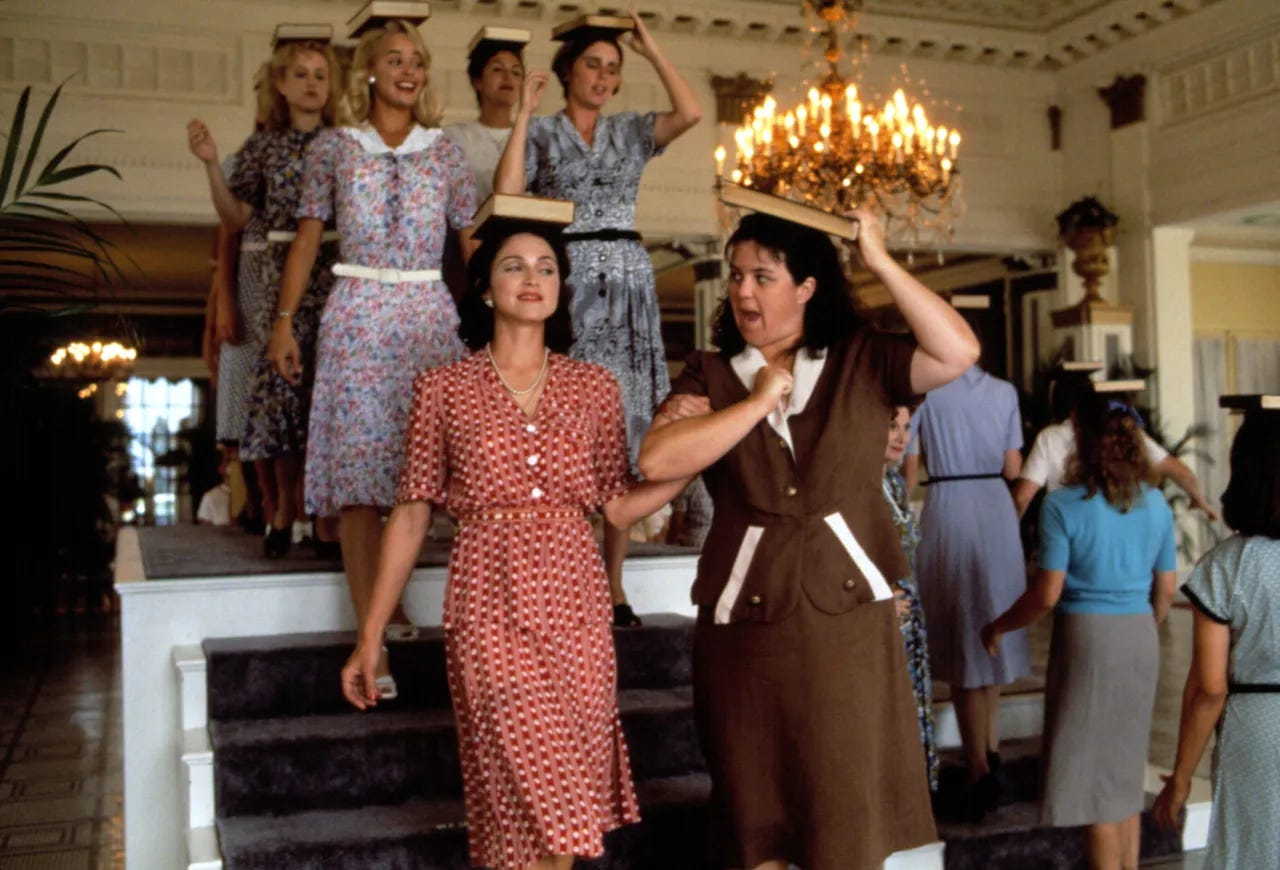A Few Words About Madonna
The Queen of Pop desperately wanted a movie career. She was never better on the big screen than in "Truth or Dare" and "A League of Their Own."

There’s a scene in Madonna: Truth or Dare, the 1991 fly-on-the-wall concert documentary, that exposes its subject through the eyes of an unlikely source: Her then-boyfriend, Warren Beatty, a movie star with stricter boundaries between his public and private selves.
As a doctor examines Madonna’s throat during her blockbuster Blond Ambition tour, filmmaker Alek Keshishian captures the awkward footage.
“Do you want to talk off-camera?” the doctor asks his patient, to which Beatty, looking on with exasperation, offers unsolicited commentary.
“She doesn’t want to live off-camera, much less talk!” he laments. “There’s nothing to say off-camera. Why would you say something if it’s off-camera? What point is there [to] existing?”
Beatty goaded Madonna to acknowledge Keshishian’s presence and the “insanity” of thrusting innocent bystanders into her spotlight, of turning a routine doctor visit into another performance.
“You want to think about that, don’t you?” he needles.
“No, I don’t,” she replies, attempting to sway the camera from Beatty, her pseudo-intellectual foil, to the important matter at hand. “Let’s get back to my throat.”
Suffice it to say, that relationship did not last. Anyone who associated with Madonna in her heyday became part of the publicity circus that buzzed around her, 24-7. Beatty couldn’t hang. (Understandable!) Thirty years ago, the icon granted a level of access to Keshishian that was unprecedented for its time and is now the celebrity standard. The Material Girl, a chameleon who changed her image at warp speed, well understood that her ability to maintain her fame did not rest solely upon the shoulders of her brilliant, chart-topping pop songs. To stay at the top, she had to keep pushing boundaries, breaking taboos and grabbing headlines. She held on to the cutting edge with breathless focus, for as long as she could, earning as many fans as critics along the way. Where an actor might proclaim, “What I really want to do is direct,” Madonna had always intended to parlay her music career into movie stardom. Perhaps she was attracted to Beatty in part because he gave her aspirations credibility; she, in turn, made the aging matinee idol relevant.
My latest Hollywood saga, No Crying in Baseball: The Inside Story of A League of Their Own, officially hits stores today, wherever books are sold! It’s an Amazon Best Book of the Month and the reviews have been kind, with Booklist calling it “deliriously fun stuff” and “undeniable movie-history magic.” Media outlets excerpted sections, and not surprisingly, most zeroed in on Madonna, who played “All the Way” Mae Mordabito, a brash, streetwise ballplayer, in A League of Their Own, which she filmed months after winding down Blond Ambition. In Vanity Fair’s excerpt, she brings her extreme work ethic and pot-stirring persona to rehearsals for the classic baseball film; at night, she hits drag shows and dance clubs, riding passenger-side in a friend’s Toyota Tercel and tolerating John Cusack’s efforts to engage her in conversation. It’s filled with the dizzying action and hyper-specific details that I love to report and write, thanks to the extraordinary memories of the people who were there. I wanted readers to feel like they were there too.
My reporting on Madonna unearthed plenty of surprises. Like, I audibly GASPED when I heard whom she was canoodling with, and that if she liked another actress’ improvised comedy bit, she’d steal it for herself; that she made Rice Krispies treats for her birthday party in a rural rental home that, most frustrating, did not have MTV; that she’d left the set early one day, causing her director, Penny Marshall, to threaten, “I’ll write her out of the movie! I’ll make her pregnant!” (Didn’t Penny know “Mo” had an empire to run?)
Her mother, also named Madonna, died of breast cancer when she was just five years old, creating a void of love to be filled by millions of strangers. She collected friends who felt like mother figures, including Rosie O’Donnell, her League co-star and confidante. Rosie had lost her mother the same way. I did not expect to shed tears while hearing about the time that Madonna stared at her reflection in the makeup mirror and said, “I miss my Mommy.” Rosie got up and gave her a hug.
I learned that without cameras around to document her every move, she still behaved as though she were being watched at all times. After all, she had a role to perform, one that amplified her private self. It was “Madonna,” and it was the role of a lifetime. While she earned recognition for her big-screen forays in Evita and Desperately Seeking Susan, if not that Oscar she desperately sought, I would argue that A League of Their Own was her best work. She got to be cheeky and tough and really, really funny. She slid into bases. She danced the jitterbug. She wore amazing vintage clothes. Out of all the Rockford Peaches, she looked the coolest. In other words, she played herself.
If you’re in Chicago tonight, you can find me signing copies of No Crying in Baseball at City Lit Books circa 6:30 p.m., and on September 20, I’ll be talking cinema and baseball at L.A.’s beloved Book Soup. (Start time: 7 p.m.) Thanks, as always, for your support! Yours in “There’s no crying in baseball!!!,” Erin.




Oh c’mon. Who was she canoodling with. You can’t leave us hanging like that 😭❤️
Gawd, I hope it wasn't Cusack. I thought he had more sense than that.